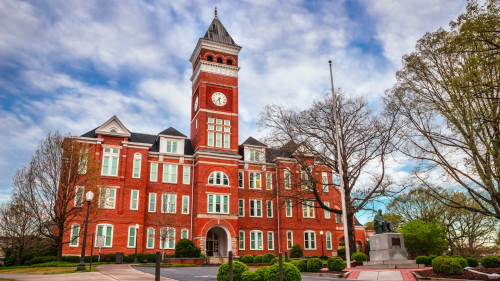Download the full report.
INTRODUCTION
College-age students tend to be the demographic that most eagerly speaks out for change. Vietnam War protests in the late 1960s and recent nationwide protests against war in the Middle East have made the headlines over the years, but small ball demonstrations over parking or dining hall food are not uncommon on college campuses. Because Palmetto Promise Institute believes that the free exchange of opinion in a marketplace of ideas is essential in higher education, we are committed to ensuring that colleges protect students’ right to speak out on issues that matter to them, regardless of ideological perspective.
This report examines policies relating to free speech and expression within South Carolina public institutions of higher education. We excluded private institutions because they are not owned and operated by government; thus, they are not inherently obliged to follow the First Amendment to the United States Constitution. Most private colleges (Furman University and Wofford College in particular) have committed themselves to open debate, but the First Amendment only guarantees that government entities protect free expression.
This narrative analysis and quantitative grading of South Carolina higher education institutions was conducted using the exemplary standards developed by the Foundation of Individual Rights and Expression (FIRE). The use of FIRE’s parameters does not necessarily imply endorsement by or co-authorship with FIRE. This research was conducted entirely by Palmetto Promise Institute, which is solely responsible for its content.
METHODOLOGY
To evaluate higher education free speech policies on a more granular level, we used a rubric to rank the following policy categories which we obtained from the Foundation for Individual Rights in Expression (FIRE):
- Harassment policies
- Policies on tolerance, respect, and civility
- Policies on “bias” and “hate speech”
- Bullying policies
- Protest and demonstration policies
- Posting policies
- Internet usage policies
- Policies restricting freedom of conscience
- Security fee policies
For more detail on why each of these policy categories was included in our analysis, we refer you to the standards and model policies set by FIRE. The analysis and grading of these schools were
Each institution received a score of 1-3 using the following grading guide:
1 The policy does not protect certain kinds of speech, unjustly or unnecessarily restricts exhibitions of speech, or inhibits access to information. | 2 The policy has at least one component that limits a small subset of speech or which can be construed to restrict free expression. | 3 The policy does not restrict free speech beyond narrowly tailored, commonsense measures. It does not block access to information dissemination and actively champions First Amendment rights. |
In some cases, schools marshal around an idea, like opposing bullying, but lack a specific policy to back up that philosophy. When that occurred, we scored the relevant category as a 2. We chose to do this for a couple of reasons. First, the schools usually had other general policies or statements of intent that did not provide us a reason to believe they would exploit that loophole. Second, in some categories it is better to lack policies rather than to have ill-conceived ones. Hate speech regulations, for example, can be drafted well, but they can easily approach speech-restricting territory.
Because we wished to conduct this evaluation in a transparent and aboveboard manner, we contacted those in charge of policies (often student affairs offices) at every university to verify that we were reviewing the correct codes and not missing any nuances. In particular, we clarified the stance of the several University of South Carolina branch campuses, which relied on their own policies in some instances and system policies in others.
We noted that several universities have adopted The Chicago Statement, as Dr. Oran Smith noted in July 2023. This was a factor in our analysis, but we intentionally focused more on the schools’ individual policies. Declarations of intent or belief like Chicago are admirable, but the proof is in the pudding—or in specific policies, rather.
RESULTS
The results are in: here is how each institution scored. For details on each university’s policies and ranking, please refer to the more in-depth evaluation in Appendix I.
| UNIVERSITY | SCORE |
| Clemson University | 3.00 |
| Coastal Carolina University | 3.00 |
| College of Charleston | 3.00 |
| University of South Carolina Columbia | 3.00 |
| Francis Marion University | 2.88 |
| Lander University | 2.88 |
| University of South Carolina Aiken | 2.78 |
| University of South Carolina Salkehatchie | 2.78 |
| University of South Carolina Upstate | 2.78 |
| Winthrop University | 2.78 |
| University of South Carolina Sumter | 2.67 |
| University of South Carolina Union | 2.67 |
| University of South Carolina Beaufort | 2.44 |
| University of South Carolina Lancaster | 2.44 |
| South Carolina State University | 2.33 |
| The Citadel | 2.33 |
Palmetto Promise Institute is pleased to announce that no university in the state scored a 1 average, but there’s still plenty of work to be done to protect the rights of students to champion issues important to them.
LOOKING TO THE FUTURE
In the 2025-2026 legislative session, lawmakers should reintroduce legislation similar to H.3467, known nationwide as the FORUM Act (Forming Open and Robust University Minds). Elements of FORUM were included in H.4289, which bans public higher education institutions from viewpoint discrimination against students and employees. H.4289, primarily a Diversity Equity and Inclusion bill, passed the House of Representatives but was not taken up in the Senate. PPI has previously advocated for its adoption.
Even if H.3467 or H.4289 were to become law, however, every public university should affirmatively adopt its own policies that protect free expression, demonstrating the institution’s voluntary commitment to the First Amendment without legislative pressure. Based on our analysis, as shown by their high scores, some have done this nearly perfectly. They serve as ready models for those whose scores indicate there is work to do.
The Bottom Line: As a whole, South Carolina public institutions of higher education have come a long way in a short time on the issue of free expression. Adoption of the aspirational Chicago Statement was rare just a few years ago. It is now much more common. This general pledge of support has led to a second stage where universities have adopted specific policies implementing that pledge. But consistency across all institutions is needed. Should the General Assembly choose to pass legislation, many universities will be in compliance on Day 1, as was the case with the founding documents bill (the REACH Act).
Our full report has a breakdown of each university’s score, as well as examples of good free speech policies. Read more below or download the full report.:







